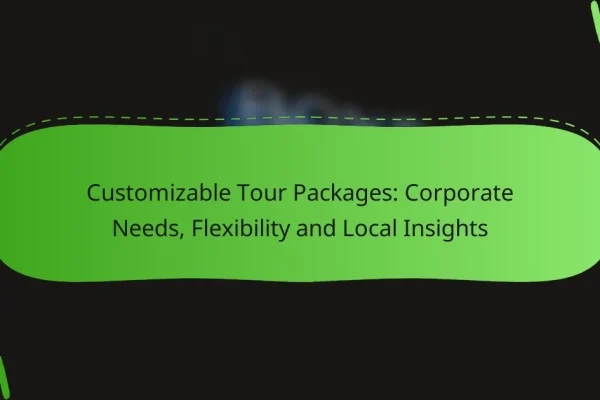What are the benefits of private tours in major cities?
Private tours in major cities offer tailored experiences that cater to individual preferences and needs. They provide a unique opportunity to explore at your own pace, ensuring a more intimate and engaging experience compared to group tours.
Personalized experiences
Private tours are designed to match your interests, whether you are passionate about art, history, or food. You can choose specific attractions or hidden gems that resonate with you, allowing for a deeper connection to the city.
For instance, if you love local cuisine, a private tour can include visits to lesser-known restaurants or markets that showcase authentic dishes. This level of customization enhances your overall enjoyment and satisfaction.
Flexible itineraries
With private tours, you have the freedom to adjust your itinerary on the fly. If you find a particular site fascinating, you can spend more time there without worrying about the constraints of a group schedule.
This flexibility is especially beneficial in cities with unpredictable weather or traffic, as you can easily modify your plans to make the most of your day. Always communicate your preferences with your guide to ensure a smooth experience.
Expert local guides
Private tours typically feature knowledgeable local guides who provide insights that you might not find in guidebooks. These experts can share stories, cultural nuances, and historical context that enrich your understanding of the city.
Choosing a guide with expertise in your areas of interest can significantly enhance your experience. Look for reviews or recommendations to find guides who specialize in the themes that intrigue you, such as architecture, local traditions, or culinary arts.
How to choose the right private tour company?
Choosing the right private tour company involves assessing their reputation, flexibility in planning, and pricing. A well-reviewed company that offers tailored itineraries at a reasonable cost can enhance your travel experience significantly.
Check reviews and ratings
Start by researching online reviews and ratings from previous customers. Websites like TripAdvisor and Google Reviews provide insights into the experiences of others, helping you gauge the reliability and quality of service offered by the company.
Look for companies with consistently high ratings and read both positive and negative reviews to get a balanced view. Pay attention to comments about customer service, itinerary flexibility, and overall satisfaction.
Evaluate customization options
Customization is key to a great private tour experience. Ensure the company allows you to tailor the itinerary based on your interests, such as cultural experiences, adventure activities, or culinary tours.
Ask about the level of personalization available. Some companies may offer set packages with limited options, while others might work closely with you to create a completely unique experience. This flexibility can significantly enhance your enjoyment of the trip.
Compare pricing structures
Understanding the pricing structure is crucial when selecting a private tour company. Prices can vary widely based on the level of service, inclusions, and the destination. Look for transparency in pricing to avoid hidden fees.
Request detailed quotes from multiple companies and compare what is included, such as accommodations, meals, and transportation. Consider the overall value rather than just the lowest price, as a slightly higher cost may offer a significantly better experience.
What types of private tours are available?
Private tours come in various forms, each designed to cater to specific interests and preferences. Common types include cultural heritage tours, adventure and outdoor tours, and food and wine tours, allowing travelers to explore destinations in a personalized manner.
Cultural heritage tours
Cultural heritage tours focus on exploring the history, traditions, and art of a region. These tours often include visits to historical landmarks, museums, and local communities, providing insights into the cultural fabric of the area.
When planning a cultural heritage tour, consider the key sites you wish to visit and the stories you want to uncover. For instance, in Europe, you might explore ancient ruins, while in Asia, you could visit temples and local festivals. Engaging with local guides can enhance your experience by offering unique perspectives.
Adventure and outdoor tours
Adventure and outdoor tours are designed for those seeking excitement and physical activity. These tours may include hiking, biking, kayaking, or wildlife safaris, allowing travelers to connect with nature while enjoying thrilling experiences.
When selecting an adventure tour, assess your fitness level and the type of activities you prefer. For example, a hiking tour in the Rocky Mountains might range from easy trails to challenging climbs. Ensure you have the right gear and check for any necessary permits or regulations in the area.
Food and wine tours
Food and wine tours offer a delicious way to explore a region’s culinary scene. These tours typically include tastings at local restaurants, markets, and vineyards, allowing participants to sample regional specialties and learn about local food production.
To make the most of a food and wine tour, research the local cuisine and popular dishes. In Italy, for example, you might enjoy pasta-making classes and wine tastings in Tuscany. Be sure to communicate any dietary restrictions to your tour provider to ensure a satisfying experience.
How much do private tours cost in different regions?
The cost of private tours varies significantly by region, influenced by factors such as local demand, duration, and included services. Generally, prices can range from a few hundred to several thousand dollars, depending on the destination and itinerary specifics.
Pricing in Europe
In Europe, private tours typically range from €200 to €1,500 per day, depending on the country and type of experience. For instance, a guided city tour in popular destinations like Paris or Rome may cost around €300, while more specialized experiences, such as wine tours in Tuscany, can exceed €1,000.
When planning a private tour in Europe, consider the time of year, as peak seasons can drive prices higher. Booking in advance often provides better rates and availability.
Pricing in North America
Private tours in North America generally range from $150 to $2,000 per day. For example, a half-day tour in New York City might cost around $400, while a multi-day adventure in national parks can reach upwards of $1,500, especially if accommodations and meals are included.
It’s advisable to compare different tour operators and read reviews to ensure you get value for your money. Look for packages that offer group discounts if traveling with others.
Pricing in Asia
In Asia, private tour prices can vary widely, typically ranging from $100 to $1,000 per day. Countries like Thailand and Vietnam often offer more affordable options, with day tours starting around $100, while luxury experiences in Japan can reach $800 or more.
Be aware of additional costs such as entrance fees and transportation, which may not be included in the initial price. Researching local customs and expectations can enhance your overall experience.
What should be included in a tailored itinerary?
A tailored itinerary should encompass personalized elements that reflect the traveler’s interests and preferences. Key components include must-see attractions, local dining options, and efficient transportation arrangements to enhance the overall experience.
Key attractions and landmarks
When planning a tailored itinerary, identifying key attractions and landmarks is essential. These should align with the traveler’s interests, whether they prefer historical sites, natural wonders, or cultural experiences. For instance, a trip to Italy might include the Colosseum in Rome or the canals of Venice.
Consider the time required to visit each site and any entry fees. It’s wise to prioritize popular attractions, especially during peak seasons, to avoid long wait times. Booking tickets in advance can often save time and ensure access.
Local dining experiences
Incorporating local dining experiences into a tailored itinerary enhances cultural immersion. Researching restaurants that offer regional cuisine can provide a more authentic taste of the destination. For example, trying tapas in Spain or street food in Thailand can be memorable highlights.
Reservations are recommended for popular dining spots, particularly in urban areas. Travelers should also consider dietary restrictions when selecting restaurants to ensure a pleasant dining experience.
Transportation arrangements
Effective transportation arrangements are crucial for a seamless travel experience. Depending on the destination, options may include public transit, rental cars, or private drivers. Each choice has its pros and cons; for instance, public transport is often cost-effective but may be less convenient.
When planning, consider the distances between attractions and the time needed for travel. For urban destinations, using apps for ride-sharing services can be a flexible alternative to traditional taxis. Always check local regulations regarding vehicle rentals, including insurance requirements and driving laws.
What are the prerequisites for booking a private tour?
Booking a private tour typically requires a few key prerequisites, including advance planning, a clear understanding of your preferences, and sometimes a deposit. These elements ensure a smooth experience tailored to your needs.
Advance booking requirements
Most private tours require booking several weeks to months in advance, especially during peak travel seasons. This advance notice allows tour operators to customize your itinerary and secure necessary reservations.
When booking, consider the specific requirements of the destination. Some locations may have limited availability or specific regulations that necessitate early planning. For example, popular attractions may require timed entry tickets that can sell out quickly.
To avoid common pitfalls, always confirm the booking policies of the tour provider. Look for details on cancellation policies, deposit amounts, and any flexibility in rescheduling. A checklist of your must-see sites can also help streamline the process.












